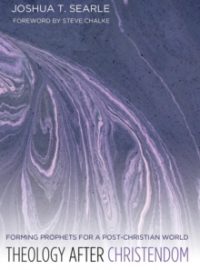-


Theology After Christendom: forming prophets for a post-Christian world
Culture & MissionChristianity must be understood not as a religion of private salvation, but as a gospel movement of universal compassion, which transforms the world in the power of God's truth. Amid several major global crises, including the rise of terrorism and religious fundamentalism and a sudden resurgence of political extremism, Christians must now face up fearlessly to the challenges of living in a "post-truth" age in which deceitful politicians present their media-spun fabrications as "alternative facts." This book is an attempt to enact a transformative theology for these changing times that will equip the global Christian community to take a stand for the gospel in an age of cultural despair and moral fragmentation. The emerging post-Christendom era calls for a new vision of Christianity that has come of age and connects with the spiritual crisis of our times. In helping to make this vision a reality, Searle insists that theology is not merely an academic discipline, but a transformative enterprise that changes the world. Theology is to be experienced not just behind a desk, in an armchair, or in a church, but also in hospitals, in foodbanks, in workplaces, and on the streets. Theology is to be lived as well as read£23.99 -


A Future and a Hope: Mission, Theological Education, and the Transformation of Post-Soviet Society
Culture & Mission, Everyday LifeAfter more than twenty years since the fall of the USSR, the evangelical movement in post-Soviet society has entered a crucial phase in its historical development. Setting out a transformative vision of mission and theological education, this book makes an important contribution towards the renewal of the church in this fascinating--but deeply troubled--part of the world. After the violent and disruptive events that followed the Ukrainian Revolution of Dignity and Freedom in 2013/14, the evangelical movement in post-Soviet society now has an unprecedented opportunity to become a shining example of a "church without walls." Searle and Cherenkov reflect on the political, social, cultural, and intellectual legacy of the Soviet Union and offer bold and innovative proposals on how the church can rediscover its prophetic voice by relinquishing its debilitating dependence on the state and, instead, expressing solidarity with the people in their legitimate aspirations for freedom and democracy. Notwithstanding the pessimism and lament expressed on many pages, the authors conclude on a positive note, predicting that the coming years will witness a flowering of evangelical ecumenism in action as Christian solidarity flourishes and overflows denominational boundaries and parochial interests.£15.99
